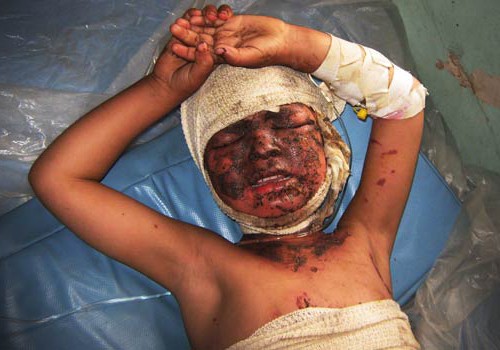By Thalif Deen at the United Nations
When civilians get killed in conflicts in Sudan, Zimbabwe or Sri Lanka, the United Nations predictably raises hell. But when civilians are victims of domestic insurgencies or military conflicts involving the five big powers -- the US, Britain, France, China and Russia (plus Israel) -- the Security Council invariably remains silent or paralysed.
The UN has one yardstick, a shorter one, to measure the military failings of the five veto-wielding permanent members of the Security Council and a longer yardstick to measure the rest of the world. The bottom line is clear: if you have tremendous political, diplomatic, economic and military clout -- as these countries do -- you can get away with pure unadulterated murder -- whether in Iraq, Afghanistan, Palestine, Chechnya or Tibet.
...
According to the United Nations, total civilian killings in Afghanistan last year alone were over 2,000. The Western military has a euphemism for civilian killings: "collateral damage," reducing humans to buildings and inanimate objects.
Last week, US air strikes reportedly killed "more than 100 civilians in western Afghanistan threatening to stiffen Afghan opposition to the war, just as the Obama administration is sending 20,000 more troops to the country," according to a report in the New York Times.
An attempt to blame some of the killings on the Taliban was described as "thinly sourced." The damage apparently was so extensive it could have been caused only by air strikes, not by grenades.
US Defence Secretary Robert Gates, who was on a visit to Kabul, said apologetically: "We regret any -- even one -- innocent Afghan civilian casualty. And we will make whatever amends are necessary."Besides civilian killings by US air strikes, there have also been casualties by European forces, including British, French and German.
According to the United Nations, total civilian killings in Afghanistan last year alone were over 2,000. The Western military has a euphemism for civilian killings: "collateral damage," reducing humans to buildings and inanimate objects.
Last week a report by a UN Board of Inquiry on Israeli attacks on UN offices during the Gaza conflict last December-January was equally revealing. The focus this time, was not on civilian killings of Palestinians, but on death and destruction caused to UN staffers and UN premises during the air strikes.
The Board of Inquiry, comprising Ian Martin, Larry Johnson, Sinha Basnayake and Lieutenant Colonel Patrick Eichenberger, was mandated to investigate the nine most serious incidents involving UN personnel and property during the sustained Israeli military attacks on Gaza during the conflict with the Islamic militant organisation, Hamas.
The Israelis repeatedly attacked UN compounds even after giving several personal assurances to the secretary-general that they would not single out the United Nations for any military strikes. These attacks resulted in deaths and injuries.
The destruction of U.N. property resulted in damages costing over $10.4 million to the UN Relief and Works Agency (UNRWA) and more than $700,000 dollars to the Office of the Special Coordinator for the Middle East Peace Process.
Asked about compensation, Secretary-General Ban Ki-moon told reporters last week he "intends" to seek reparations or reimbursement for loss and damage incurred by the United Nations.
But similar demands from Israel over death and destruction caused to UN personnel and premises in Lebanon have never been met.
"As you know, I have been carefully reviewing these recommendations with a view to determining what course of action the United Nations and I, as the secretary-general, should take in future, if any," he added.
But in a letter to the president of the Security Council, Ambassador Vitaly Churkin of Russia, Ban explicitly said: "I do not consider it necessary for me to initiate any further formal inquiry in this regard, which is outside the terms of reference of this Board."
But Amnesty International, which is calling for a broader inquiry into the civilians killings in Gaza, said it was disappointed by the secretary-general's tepid response.

Up to 120 people, including civilians, were reported to have been killed in a series of US airstrikes on two villages of Farah province in Western Afghanistan on May 5, 2009. (Photo: AFP)
(More photos...)
The Board concluded that the actions of the Israeli Defence Forces (IDF) involved varying degrees of negligence or recklessness with regard to UN premises and to the safety of staff and other civilians within those premises, with consequent deaths, injuries and extensive physical damage and loss of property. In the case of the UNRWA Jabalia School, the Board concluded "that the precautions which the IDF may have taken as regards the UN premises were inadequate, while the responsibility of the parties with respect to the many civilians killed and injured outside the school, were to be assessed in accordance with the rules and principles of international humanitarian law, and requires further investigation."
At the time of the attacks, the IDF defended its actions by saying that its military strikes were a response to Hamas mortar fire within the school premises, and that Hamas militants were hiding in, or had taken over the school. The report said it "found that these allegations were untrue, continued to be made after it ought to have been known that they were untrue, and were not adequately withdrawn and publicly regretted."
In plain language, the Board said the Israelis were lying. The Board also noted that at the time of the writing of the report, the allegation that there was firing from the UNRWA Jabalia school "remained on the website of the (Israeli) Ministry of Foreign Affairs."
But since Israel has such strong Western support in the Security Council, the indictment against the Jewish state is not expected to result in strictures or sanctions. Israel is also the only UN member state which implicitly exercises a veto power while remaining outside the Big Five in the Security Council.



